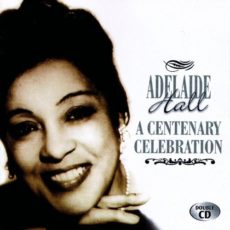
Daily Dose Of Jazz…
Adelaide Louise Hall was born on October 20. 1901 in Brooklyn, New York and began her stage career in 1921 on Broadway in the chorus line of the Noble Sissle and Eubie Blake hit musical Shuffle Along. She went onto appear in a number of similar black musical shows including Runnin’ Wild on Broadway in 1923, in which she sang James P. Johnson’s hit song Old-Fashioned Love.
In 1925, Hall toured Europe with the Chocolate Kiddies revue that included songs written by Duke Ellington, backed by the Sam Wooding Orchestra. The following year appeared in the short-lived Broadway musical My Magnolia after which she appeared in Tan Town Topics with songs written by Fats Waller and had a short road tour on the TOBA circuit. She then starred in Desires of 1927, with a score written by Andy Razaf and J. C. Johnson, that toured America for a year between 1926 and 1927.
In 1927 Adelaide recorded her wordless vocals on Creole Love Call, The Blues I Love To Sing and Chicago Stomp Down with Duke Ellington and his Orchestra. The recordings were worldwide hits and catapulted both careers into the mainstream. She and Duke Ellington went on to record I Must Have That Man and Baby. She starred on Broadway with Bill “Bojangles” Robinson, Tim Moore and Aida Ward in Blackbirds of 1928. The show became the most successful all-black show ever staged on Broadway at that time and made Hall and Bojangles into household names. It was this musical that not only secured her success at home and abroad in Europe when the production was taken in 1929 to Paris, France, where it ran for four months at the Moulin Rouge. In Europe she rivaled Josephine Baker for popularity on the European stage.
With Blackbirds′ music score written by Jimmy McHugh and lyrics by Dorothy Fields, Hall’s performances of the songs I Can’t Give You Anything but Love, Baby, Diga Diga Do, Bandanna Babies and I Must Have That Man made them into household hits, and they continued to be audience favourites throughout her long career. Through the 1930s she would perform on Broadway again with Bojangles in Brown Buddies, toured worldwide, discovered and hired blind pianist Art Tatum and recorded with him Strange as it Seems, I’ll Never Be The Same, This Time it’s Love and You Gave Me Everything but Love. She would continue to tour America, Canada and South America before turning to Europe once again and settling in Paris, France. Her husband, Bert Hicks, opened a nightclub for her called La Grosse Pomme where she entertained often. The Quintette du Hot Club de France featuring Django Reinhardt and Stephane Grappelli were one of the house bands at the club.
Leaving Paris for London, England in 1938, she lived out the rest of her days there, becoming one of the most popular singers of her time. Hall recorded I Can’t Give You Anything But Love and That Old Feeling at London’s Abbey Road Studios with Fats Waller. Throughout her career she made more than 70 records for Decca, had her own BBC Radio series Wrapped in Velvet, making her the first black artist to have a long-term contract with the BBC, became one of the highest paid entertainers in the United Kingdom and appeared on the stage, in films, and in nightclubs, of which she owned her own in New York, London and Paris.
Adelaide would go on to record with Humphrey Lyttleton, and perform alongside Lena Horne, Spike Milligan, John Betjeman, Ethel Waters, Josephine Baker, Louis Armstrong, Cab Calloway, Fela Sowande, Rudy Vallee, Jools Holland, Tony Bennett, Phyllis Hyman, Jacques Loussier, Alan Downey, Wayne Sleep, Ronnie Scott, Stan Tracey, the New Swingle Singers, Elisabeth Welch, Gregory Hines, Bobby Short, Honi Coles, Edith Wilson, Nell Carter, John W. Bubbles, Dizzy Gillespie, Herbie Hancock, Stephane Grappelli, Mel Torme, Zoot Sims, Carmen McRae and Chick Corea, among a list too vast to mention.
She pioneered scat singing along with Louis Armstrong and is widely acknowledged as one of the world’s first jazz singers, holds the accolade of being the 20th century’s most enduring female recording artist, her recording career having spanned eight decades, In the 100 Great Records of the 1920s she is at number 26 with Duke Ellington’s Orchestra, singing The Blues I Love To Sing, and her recording of the Dorothy Fields/Jimmy McHugh tune I Can’t give You Anything But Love represent 1928 in the American Society of Composers, Authors and Publishers (ASCAP) celebration of its centenary timeline of songs chosen to represent the past hundred years.
Singer, dancer, actress and nightclub chanteuse Adelaide Hall, who entered the Guinness Book of World Records in 2003 as the world’s most enduring recording artist having released material over eight consecutive decades, passed away on November 7, 1993, aged 92, at London’s Charing Cross Hospital.
More Posts: vocal


